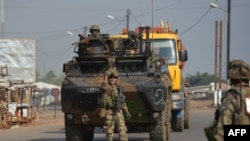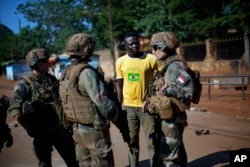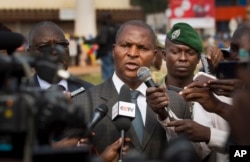France will stop military operations in the Central African Republic later this year after France's defense minister said its objectives have been achieved.
The mission, dubbed Operation Sangaris, began in 2013 as the country was being consumed by ethnic violence between Christians and Muslims and people were dying by the thousands.
"The country was in the throes of civil war, torn by religious tensions, plagued by chaos, on the brink of pre-genocidal scenarios. In the space of two years, the Sangaris force restored calm and prevented the unacceptable,” Jean-Yves Le Drian said before a group of French soldiers stationed at the M’Poko airport.
"Of course everything is not resolved but we can finally see the country emerging from a long period of trouble and uncertainty.”
Le Drian did not specify exactly when this year France would completely pull out of the country, but it has dramatically reduced the number of troops stationed in the C.A.R. since the operation reached its peak. France had around 2,500 troops deployed in the country, but that number is now around 900.
UN-EU coalition force
The pullout of French troops will coincide with the build-up of a coalition force of 12,000 troops from the United Nations and European Union. About 300 French troops will stay in the country and be part of the coalition force.
The conflict in the C.A.R. began in March 2013 when a group of predominantly Muslim Seleka rebels overthrew the government of President Francois Bozize, a Christian, and installed their own leader, Michel Djotodia.
Djotodia stayed in power for around 10 months before international pressure brought in a new transitional government in 2014. A new president, Faustin-Archange Touadera, was elected in a run-off vote on February 14, and was to be sworn in Wednesday.







